Success can be achieved in a variety of ways, among them hard work, long hours, and dedication to attaining a goal. But there are some qualities which go beyond sheer effort. They are the innate gifts of instinctively realizing what market forces are at play, and how to capitalize on them. Such are the intuitive traits that have enabled Squire Cigars to arrive at the pinnacle of the retail cigar business, and to remain there for half a century.
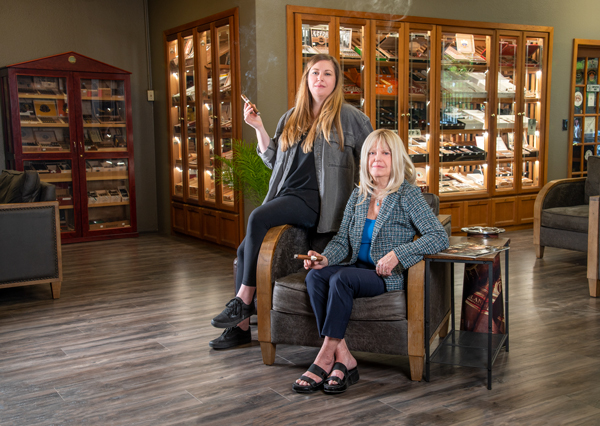
Fifty years of successful retailing is an enormous accomplishment in itself, let alone in a state that legislates against and discourages the use of the very product that keeps you in business. But Squire Cigars, first established in 1974 by Linda and Barney Squires in the bucolic wine country hamlet of Santa Rosa, California, is still going strong, possibly stronger than ever.
The success of Squire Cigars and the family that founded it is not one of happenstance, good luck, or even being in the right place at the right time. Theirs is a story of devotion to an industry, perseverance, knowing how and when to reinvent oneself, and an understanding of where market trends are heading. And it all started with a pack of cigarettes.
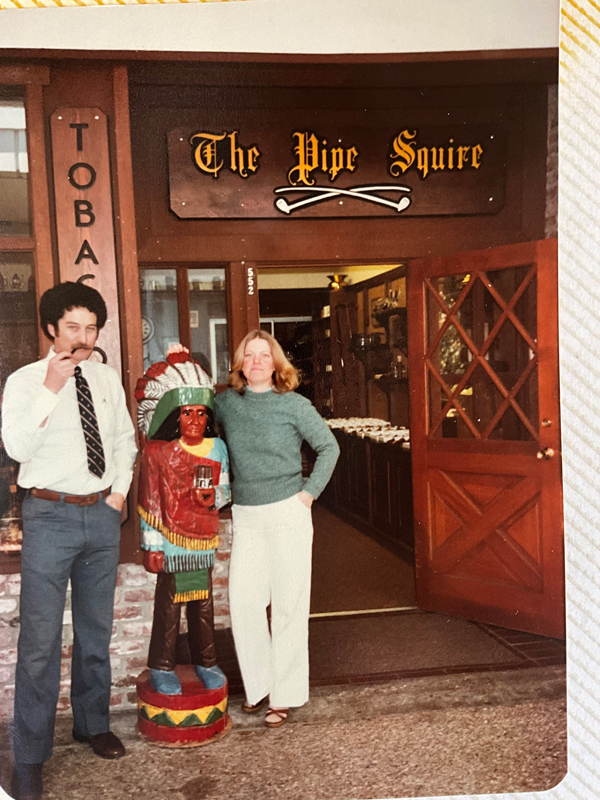
As Linda Squires tells it: “Barney and I took a trip to Europe. We fell in love with a little pipe shop in Denmark, on the Walking Street. Barney started smoking a pipe because the cost of a pack of cigarettes was one dollar, and he refused to spend that!” When they returned to their hometown, they realized there was no one selling pipes and tobacco there. “So February 10, 1974, we opened in a 300-square-foot section of an old Victorian house.” When the main tenant, a proposed restaurant, failed to materialize, the couple realized they’d need to move to a higher-traffic location. “Barney was smart enough to realize that if there was not going to be a restaurant, we would need to opt out.” This was an early example of Barney’s ability to read the tea leaves.
In October of 1974 they moved to a downtown location, and two years later expanded to Santa Rosa’s Coddingtown Mall, the same mall where Barney worked at a men’s fine clothing store. In early 1977 they closed their downtown location to focus on the mall store.
The original outdoor mall was later converted to an enclosed venue, and in 1983 The Pipe Squire was able to move inside. With the additional foot traffic came an entirely new opportunity to attract customers, those who were not necessarily smokers. Realizing the potential for increased sales, Barney and Linda took the bold step of dropping the word Pipe from their name, and in 1991 they rebranded the store as The Squire. Adding gifts and accessories to their inventory opened the business to a whole new customer base. This was yet another example of Barney’s ability to identify an opportunity or a trend, and swiftly shift the operation to embrace it.
With enough staff to help Linda run the store, Barney was able to pursue a career as a manufacturer’s sales representative, first for Villazon & Co., then Altadis U.S.A, General Cigar Corp. and eventually for Davidoff. “The important part of our history is that Barney traveled and he saw all of the trends. He saw a big trend toward espresso bars, and we did not have one in this mall.” They then cut out a corner of the store and built a full-service espresso bar.
The espresso bar was a big hit, and a great revenue generator, and remained so until 2000, when the Squires business relocated to its current, larger, strip center location. That move was predicated on another of Barney Squires’ astute observations. During his travels in calling on retailers, he noticed a pattern of tobacco shops exiting malls. As Linda recalls: “And that’s where Barney comes in again, he said, ‘Hey, the trend is they’re all leaving. And we’re next!’” Within five months of having built-out their new espresso bar, the county informed the Squireses that they “could be a non-smoking coffee bar or a smoking cigar store, but not both.” Once The Squire was no longer able to sell coffee, the family shifted the focus back to cigars, and again rebranded the business, now known as Squire Cigars. “We needed to rebrand after not being allowed to sell coffee. People would drive by, see our sign The Squire and not know what we were. So we quickly rebranded.”
The loss of the coffee bar caused a dip in revenues, but the Squireses already had a plan to pick up the slack. Daughter Kim Squires, who joined the family business full time in 2015, describes how the family once again capitalized on providing a needed service: “When we moved into our current location, we dedicated about 50 percent of our space to a wine storage facility, Squire Wine Storage. We rent lockers to customers who wish to store wine at the proper temperature. That helped soften the blow, as we had already added an additional revenue source. About 20 percent of our wine storage business is not regular customers.”
The execution of the concept was facilitated by their experience storing cigars at controlled temperature and humidity, as well as assistance from a highly regarded local wine maker, Williams Selyem. The two families have a long history of doing business, and the Squireses reached out to the winery for help with their system.
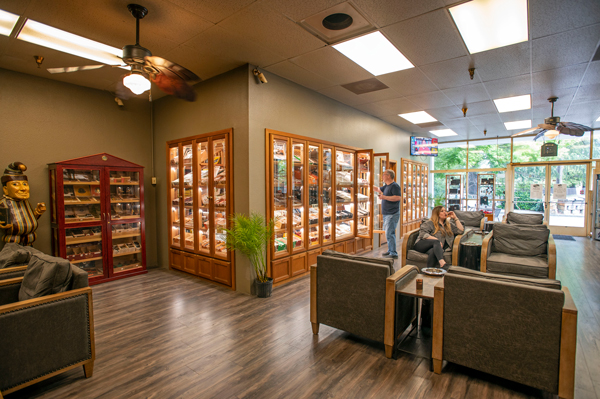
“We wanted to make sure that our customers felt comfortable storing high-end wines in our facility. If it was good enough for Williams Selyem we knew it was good enough for our customers,” says Kim. The storage area is separate from the retail store, and is one of two non-smoking areas in the building, the other being the cigar humidor.
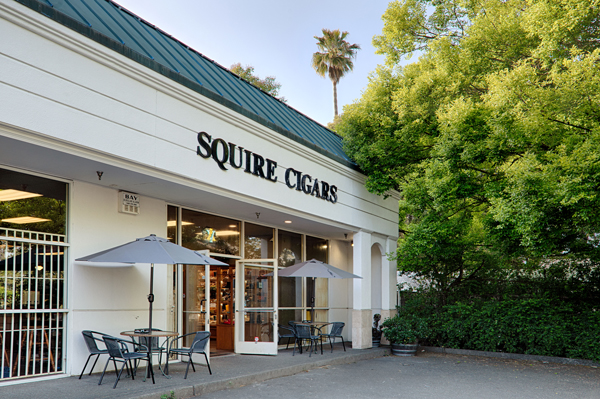
The 3,100-square-foot store has around 1,800 square feet of retail space, including a spacious and comfortable lounge, with the rest dedicated to wine storage. But customer storage is not limited to wine. Kim points out: “The average cigar store locker is about a cubic square foot. Ours are two, and they’re nicely situated underneath the exterior of the humidor.” The store offers a full selection of both boutique and nationally recognized brands. Top sellers are Davidoff, Padrón, Oliva and Fuente. Interestingly, the top five is rounded out by Aladino, a relative newcomer to the premium cigar industry, although founder Julio R. Eiroa has been growing Corojo cigar leaf in Honduras for more than 50 years. In 2015 Julio and his son Justo formed JRE Tobacco with the goal of creating Authentic Corojo cigars reminiscent of the great cigars of the 1960s.
“My largest order at the show for the last three years is Aladino,” shares Kim. “It’s the brand we chose for our Anniversary blend.”
There are several reasons for the popularity of Aladino’s products at Squire Cigars. In part it’s because the store has been serving customers for decades, and many of those customers were very fond of the old Camacho Corojo blends. They were therefore extremely receptive to Julio and Justo Eiroa’s recreation of that iconic brand. Along with that is the very affordable price structure, making the cigars approachable for almost any cigar budget.
Equally important to the success of Aladino with Squire Cigars is the close working relationship between the Squireses and the Eiroas. Kim states: “The family has supported our store tremendously. Justo and Vivian, and their three daughters, have become like family.”
Family is a word heard over and over again in reference to how people feel about the Squireses. Vivian Eiroa recounts how the two families bonded at a PCA trade show: “We met at PCA 2019. Kim and Linda met my daughter Ariana, who was helping them. We started working together, and every PCA we see them, and there is clearly a bond, a family bond with them”.
That closeness, as well as the brand’s traction with the clientele, led to having Aladino’s Justo Eiroa create the blend for the Squire Cigars 50th Anniversary, a 6 x 54 Toro composed of the Eiroa family’s proprietary Classic Corojo tobacco, topped off by a Cameroon seed wrapper which they developed in Honduras.
“I knew going into it I wanted their Cameroon wrapper. We were looking for something very classic, very old school for our 50th,” says Kim.
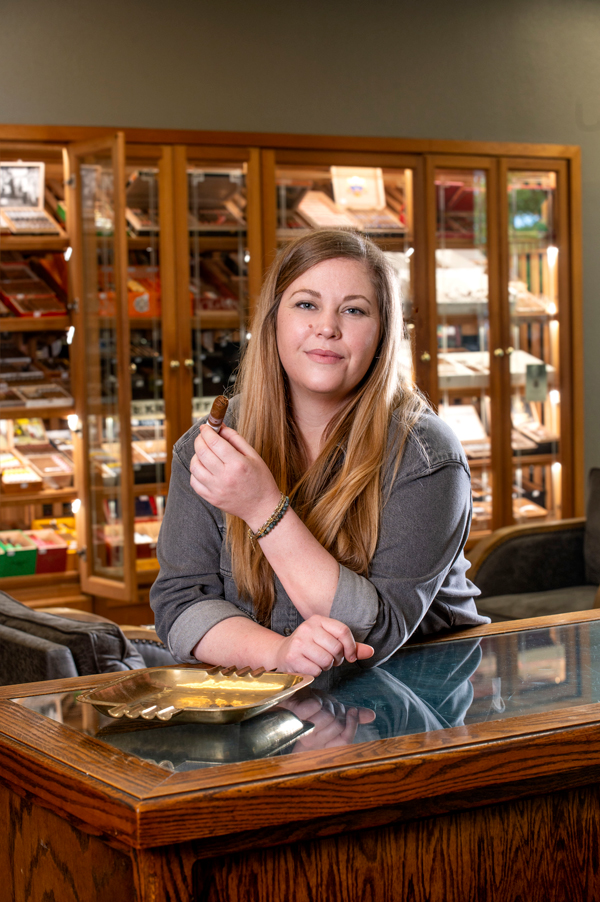
The enthusiasm and fondness for the business and its owners is echoed in comments by customers and business associates alike. Eliseo Gonzalez, who has been the area representative for Davidoff cigars for the last two years, first met Barney some 13 years earlier, when he started working for Davidoff, and Barney, a veteran rep by then, drove several hours to help Eliseo at his first-ever cigar event. When he took over the northern California territory, he recalls meeting Kim and Linda for the first time: “I immediately realized that genuine, family feeling. Basically, roots people, like what I was. Nothing frilly, this is who we are, and we got along great.”
Rick Zunt has known the Squires family for more than 20 years, first representing Peter Stokkebye Pipe Tobacco, and for the past 19 years as the regional sales representative for Arturo Fuente & J.C. Newman. Beyond the more-than-amicable business relationship he maintains with Squire Cigars, he notes, “Kim and I have grown to have a really great friendship. Theirs is a stop when I always plan some extra time, so we can go through our personal relationship first. I can be myself more, not just with my salesman hat on.”
The family feeling generated by the Squireses is represented in the relationship they have with their customers and their customers with one another. Corporate wine sales consultant Hans Dippel has been a loyal customer of Squire Cigars for 32 years. He adds a familiar refrain when describing his relationship with the Squireses: “Linda and Barney are family. We’re very close. We were just there for Super Bowl Sunday at their house. They’ve adopted me and the whole family. I’m like their older son.” Dippel frequents the store five or six days a week when he’s not playing golf with several of the other regulars. He adds the kind of refrain every retailer would love to hear: “lt’s the Cheers of the cigar industry. They’re all family.”
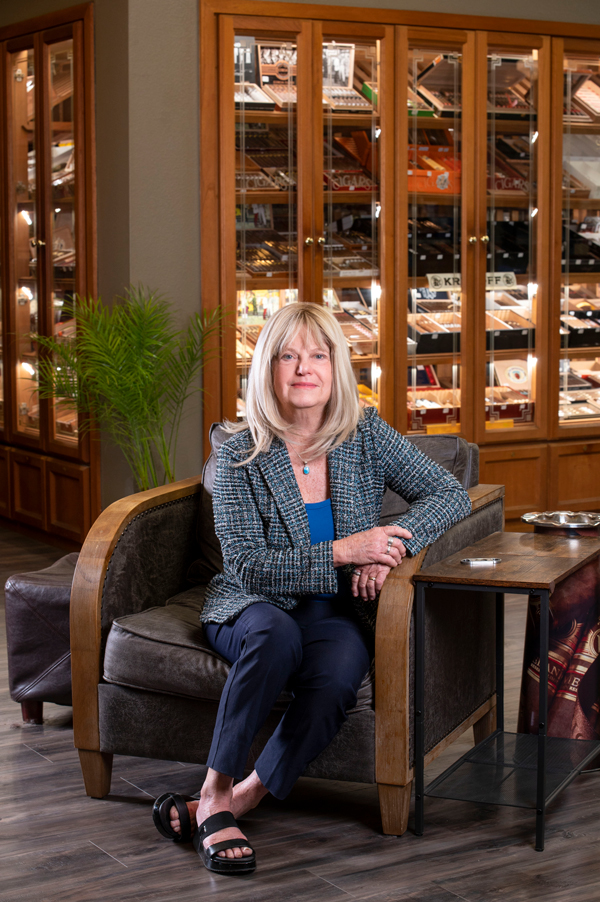
Beyond forging durable relationships with customers and business associates, the Squires’ commitment to the industry is also worth noting. Linda was on the board of the TAA for 13 years, as well as serving as its president, and being solely in charge of their catalog for 20 years. She was also on the PCA (formerly IPCPR) board for 15 years, and served as president of that organization as well. She is the only woman in premium tobacco history to have served as president of both of those national associations.
“Her ability to work on the advocacy side for premium cigars definitely plays a role in the reason we’ve been so passionate about this business,” notes Kim. “Twenty-six years of combined advocacy—that’s truly where a lot of my passion comes from. I’m now on the TAA board, and president of our state association.”
Barney was instrumental in getting the business started, then spent 30 of the last 50 years on the road. When asked about his current status with the business, Kim quickly replies, “Barney is one of those guys who retired and never looked back!”
As Linda Squires winds down her involvement with the store, and as Kim in her capacity of General Manager ramps up her efforts for both the business and the industry, she has no intention of taking her foot off the gas. She sums it up best by saying, “I’d love to celebrate 70 years one day.” And with the family’s history of excellence and accomplishment, there is no doubt that goal will be realized.
– Photography by Julie Hughes. Story by Larry Wagner.
This story first appeared in PCA The Magazine, Volume 2, 2024. To receive a copy of this magazine you must be a current member of PCA. Join or renew today at premiumcigars.org/membership.
